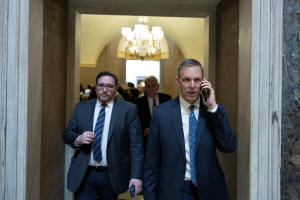U.S. Justice Dept seeks to search Republican congressman's cellphone in
Jan. 6 probe
 Send a link to a friend
Send a link to a friend
 [February 24, 2023]
By Sarah N. Lynch and Jacqueline Thomsen [February 24, 2023]
By Sarah N. Lynch and Jacqueline Thomsen
WASHINGTON (Reuters) -A U.S. Justice Department attorney urged a federal
appeals court on Thursday not to block a Republican congressman's
cellphone from investigators working on a probe into efforts by
then-President Donald Trump to overturn the result of the 2020 election.
U.S. Representative Scott Perry - a Trump ally who helped spread false
claims that the 2020 election was stolen through widespread voting fraud
- has sought to prevent the Justice Department from reviewing the
contents of his cellphone since it was seized last summer.
At the heart of the legal dispute is whether the contents of his
cellphone are shielded from disclosure under a provision in the U.S.
Constitution that gives Congress members immunity from civil litigation
or criminal prosecution for actions that arise in the course of their
legislative duties.
Perry's conduct is under scrutiny by Special Counsel Jack Smith's office
because of the prominent role he played in the lead-up to the Jan. 6,
2021, attack on the U.S. Capitol by thousands of Trump supporters trying
to block Congress from certifying Democrat Joe Biden's election victory.

Perry's attorney John Rowley argued on Thursday that private phone calls
with people outside of Congress were part of Perry's "informal
legislative fact-finding" in the lead-up to the Jan. 6, 2021
certification of the 2020 presidential election. He said such
communications are constitutionally protected from disclosure to the
Justice Department.
Rowley asked the appellate court to reverse a lower court decision,
after Chief Judge Beryl Howell previously ruled that Perry's
communications were not within a "legitimate legislative sphere."
"That activity is protected," Rowley said. "It's an absolute privilege."
John Pellettieri, a Justice Department lawyer, urged the court to
dismiss the appeal or affirm Howell's prior ruling. He argued that calls
to outside parties by a single lawmaker to help research an issue is
"not sufficiently integral" to the congressional lawmaking process.
[to top of second column]
|

U.S. Rep. Scott Perry (R-PA) uses a cell
phone while walking to the House Chamber on Capitol Hill in
Washington, U.S., February 2, 2023. REUTERS/Tom Brenner

An investigation by the U.S. House of Representatives' Jan. 6
committee last year revealed Perry was in frequent contact with
Trump White House officials in the weeks before the attack.
The three-judge panel on Thursday did not directly indicate how they
may rule on the dispute.
Judges Gregory Katsas and Neomi Rao, both appointed by Trump,
sounded doubtful that Perry's communications with the White House
and other people outside of the legislative branch should be
automatically shielded from the Justice Department.
"This seems a little different, maybe odd, in that the privilege
holder in your theory has a privilege that extends to communications
with anyone in the world," Katsas said.
Perry also played a crucial behind the scenes role in lobbying Trump
to appoint former Justice Department official Jeffrey Clark as the
acting attorney general so that Clark could launch investigations
into Trump's false election fraud claims.
Trump ultimately declined to appoint Clark, after top Justice
Department officials threatened to resign.
Federal agents last summer seized Clark's phone as part of the
criminal investigation into efforts to overturn the election.
Agents executing a search warrant at Clark's home cited
probable-cause evidence of conspiracy, false statements and
obstruction of justice.
(Reporting by Sarah N. Lynch and Jacqueline Thomsen; Editing by
Jonathan Oatis and Alistair Bell)
[© 2023 Thomson Reuters. All rights
reserved.]This material may not be published,
broadcast, rewritten or redistributed.
Thompson Reuters is solely responsible for this content.
 |